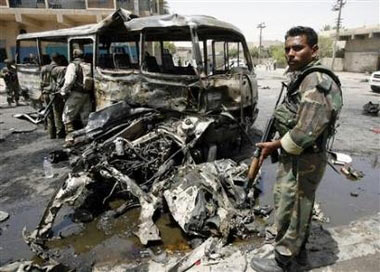A militant umbrella body affiliated to al Qaeda claimed responsibility on
Sunday for some of the bombings that killed 43 people in and near Baghdad on
Saturday in defiance of a security clampdown.
![A woman who lost both her son and husband is comforted by her daughter, right, as she grieves near the morgue of Yarmouk hospital in Baghdad, Iraq Sunday, June 18, 2006, following a parked car bomb which detonated in the Um al-Mea'alef neighborhood of southwest Baghdad on Saturday night killing 6 and wounding 22 civilians. [AP Photo]](xin_050603181939246282076.jpg)
A woman who lost both
her son and husband is comforted by her daughter, right, as she grieves
near the morgue of Yarmouk hospital in Baghdad, Iraq Sunday, June 18,
2006, following a parked car bomb which detonated in the Um al-Mea'alef
neighborhood of southwest Baghdad on Saturday night killing 6 and wounding
22 civilians. [AP Photo] |
It was one of the bloodiest days in Iraq since the leader of al Qaeda in
Iraq, Sunni Arab insurgent Abu Musab al-Zarqawi, was killed in a US air strike
on June 7.
The Mujahideen Shura Council, which had pledged to continue until "doomsday"
what it described as the holy war against crusader forces, said in a statement
that it was behind four Baghdad bombs on Saturday, out of the seven reported by
police.
The Iraqi capital was relatively calm on Sunday morning. Gunmen abducted 10
workers from a bakery in a northwestern district and police said 10 bodies, shot
and showing signs of torture, had been found in different places overnight.
The US military declined to comment on reports that American forces were
surrounding parts of the western insurgent stronghold of Ramadi to try to cut
off rebel supply lines.
A Reuters reporter in the area, which has seen frequent clashes between
insurgents and US forces, said some roads into the town were closed, but that
this was not unusual.
A US military spokesman said recently that Al Qaeda had gained ground in
Ramadi and 1,500 extra US troops brought to Iraq would try to break their grip
on the town.
One of the Baghdad attacks claimed by the Mujahideen Shura Council, a car
bomb at a checkpoint, killed 11 people.
"It was a blessed operation that led to the torching of three cars and the
killing of the soldiers around the building," the Council said in a statement
whose authenticity could not be independently verified.
The Council, which groups al Qaeda in Iraq and other Sunni Islamist militant
groups to coordinate their fight against US-led forces, said its militants were
also behind three other bombings.
It did not give the total number of people killed and two of the attacks did
not appear to match police information.
Saturday's killings came three days after 50,000 Iraqi troops backed by 7,000
US-led forces launched a security sweep to put pressure on insurgents in
Baghdad.
PM Under Pressure

Iraqi soldiers secure
the scene of a mini bus bomb attack, which killed four people, and wounded
14 in eastern Baghdad, June 17, 2006. [Reuters] |
The latest wave of violence raised questions about assertions by Iraq's
national security adviser last week that al Qaeda's days in Iraq were numbered.
It also added to pressure on Prime Minister Nuri al-Maliki, who has pledged
to crush the insurgency against his government, to reduce the bloodshed that has
killed thousands of Iraqis since the 2003 US invasion.
Zarqawi -- who was believed to have personally beheaded hostages on videos --
inspired and organized a flow of militants from across the Arab world willing to
become suicide bombers to fight US forces and the US-backed Iraqi government.
Five days after his death, al Qaeda named Abu Hamza al-Muhajir as his
successor. The US military has said it suspects that Muhajir is Egyptian-born
militant Abu Ayyub al-Masri, who formed al Qaeda's first Baghdad cell, and that
it expects him to use the same tactics as his predecessor.
In Iran, a Foreign Ministry spokesman ruled out direct talks between Tehran
and Washington on Iraq despite being encouraged to take part by an influential
Iraqi politician.
Abdul Aziz al-Hakim, head of the Supreme Council for the Islamic Revolution
in Iraq (SCIRI), a key Shi'ite Muslim party closely allied to Shi'ite Iran, said
on Saturday that such talks could benefit both Tehran and Baghdad.
But Iranian Foreign Ministry spokesman Hamid Reza Asefi told a news
conference on Sunday: "We do not have talks with the United States on the agenda
now."
Relations between former war foes Iran and Iraq have improved since the fall
of Saddam Hussein three years ago, followed by the rise to power of Iraq's
once-marginalised Shi'ite majority.